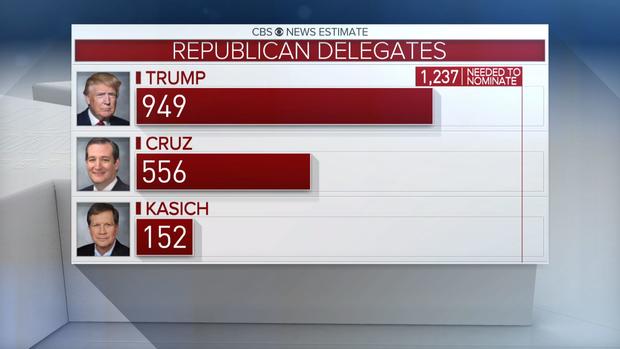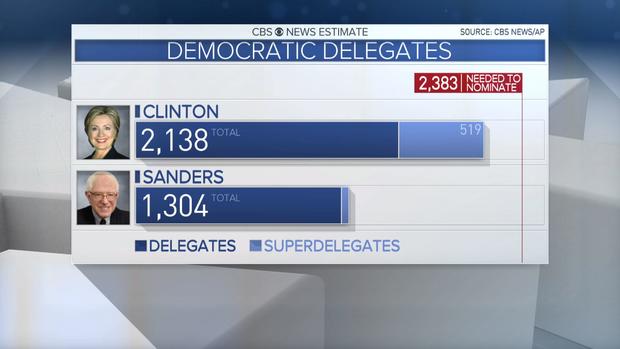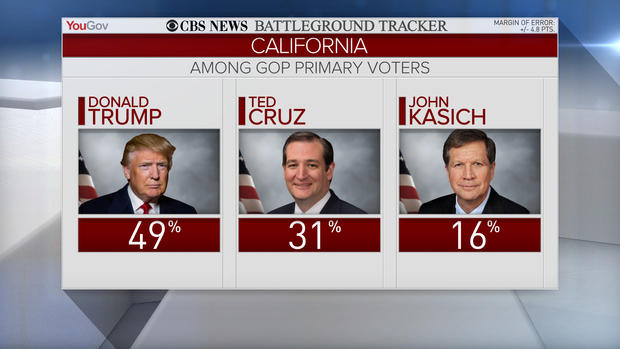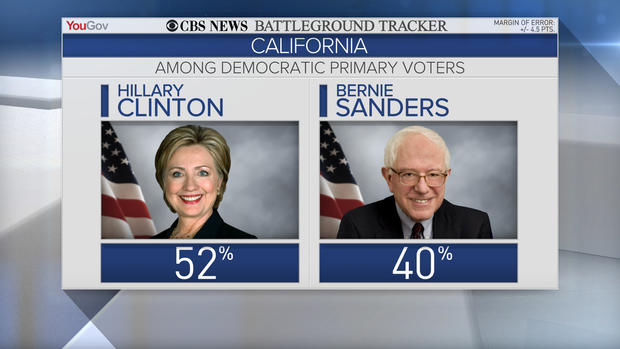2016 primaries: The final two months, by the numbers
Tuesday was another good election day for 2016 frontrunners Hillary Clinton and Donald Trump, boosting both their delegate leads and their momentum as the primary heads into the final two months.
Democrats in Republicans held contests in Pennsylvania, Maryland, Connecticut, Rhode Island, and Delaware. Trump won all five contests handily, and Clinton won four of five, losing only Rhode Island to Vermont Sen. Bernie Sanders.
The race now heads west, to what could be a pivotal race for both parties in Indiana on May 3. And after another handful of states, the biggest delegate prize for both parties - California - will effectively cap off the primary season on June 7.
But as Trump and Clinton widen their leads, can their competitors still find the time and space to change the trajectory of the race, given the dwindling number of contests left on the calendar?
Here's a look at the delegate math in both parties, along with a preview of the upcoming races.
Delegate Math
In the Republican race, CBS News estimates that Donald Trump gained 105 delegates on Tuesday night, bringing his total to 949. That means Trump would need just 288 more delegates to reach the 1,237 necessary to win the nomination on the first ballot and avoid a contested convention.
Because of his strong performance on Tuesday, he's far more likely to reach that goal than he was at the start of the week. There are only 502 more delegates up for grabs in the remaining Republican contests, and a handful of delegates remain unbound and unallocated. Trump would need to win just 45 percent of those two groups of remaining delegates to reach the magic number of 1,237. Going into Tuesday's races, Trump needed to win 52 percent of the remaining delegates.
Many analysts believe Trump may not even need to necessarily reach 1,237 in pledged delegates to ensure his nomination - that even if he's just shy of that threshold, he'd be able to convince enough unpledged delegates to support his nomination to put him over the top.
In Pennsylvania, for example, only 17 of the state's 71 delegates are assigned to the winner of the state's primary. The other 54 are ostensibly unbound, but many believe those unbound delegates will be under enormous pressure to support Trump, given the frontrunner's 35-point victory in Pennsylvania.
In his victory speech on Tuesday, Trump sounded a bullish note. "I consider myself the presumptive nominee," he said. "Gov. Kasich and Sen. Cruz should get out of the race...As far as I'm concerned, it's over."
In the Democratic race, Clinton gained 194 delegates, bringing her total to 2,138. Sanders won an additional 129 delegates, bringing his total to 1,304.
4,765 total delegates are at stake in the Democratic contest, and a candidate must obtain at least 2,383 of those delegates to be nominated. To reach that number, Clinton must win just 18 percent of the remaining delegates up for grabs. Sanders must win over 80 percent.
Even removing from the equation the 714 so-called "super delegates," which are not bound by the outcome of their state's primary, the math looks very difficult for Sanders. He would need to win roughly two thirds of the remaining pledged delegates to obtain a majority of pledged delegates by the end of the primary season. Hillary Clinton, by contrast, could lose every contest left on the calendar by double digits and still emerge with a majority of pledged delegates.
And unless Sanders is able to edge Clinton out in the final pledged delegate count, it's unlikely he'll be able to persuade super delegates - many of whom are party leaders and elected officials - to nominate him over Clinton.
Next stop: Indiana
Both parties will hold primaries in Indiana on May 3, and it's shaping up to be one of the most consequential remaining races. On the Republican side, it may be the last chance Cruz and Kasich have to stop Trump from clinching the nomination outright.
In a remarkable pair of statements on Tuesday, the Cruz and Kasich campaigns announced that they had agreed to divide up the playing field to better marshal their resources and stop Trump - Kasich would cede Indiana to Cruz, while Cruz would allow Kasich to compete unimpeded in Oregon and New Mexico.
Still, it's unclear whether Kasich's effective withdrawal from Indiana will allow Cruz to carry the state and win most of its 57 delegates. In a CBS News Battleground Tracker poll released Sunday, Trump held a slim lead in Indiana with 40 percent, Cruz was in second with 35 percent, and Kasich was in last with 20 percent.
On the Democratic side in Indiana, it's also a close race, with 83 delegates at stake. In the latest CBS News Battleground Tracker, Clinton held a slim 49 to 44 percent lead over Sanders, within the poll's margin of error.
It's no surprise the race is so competitive - Clinton has won neighboring Ohio and Illinois, but Sanders has also had some success in the Midwest, carrying Michigan and Wisconsin. Still, given the proportional allocation of delegates in the Democratic race, unless one candidate or another is able to open up a big lead, the results from Indiana may not make much of a difference in the overall delegate math.
Race to the Finish
After Indiana, there will be just over a month left on the primary calendar. On May 10, Republicans in Nebraska and West Virginia will vote, and on May 17, Republicans in Oregon will vote. Public polling out of those contests is scarce, but anti-Trump Republicans are hoping that Cruz's withdrawal from Oregon will allow Kasich to claim victory there.
In June, the Republican race will see its grand finale, when voters in California, Montana, New Jersey, New Mexico, and South Dakota head to the polls. Kasich, per his agreement with Cruz, will be hoping for a strong showing in New Mexico. But the biggest prizes of the night - New Jersey and California - look like Trump territory, at this point. A Rutgers-Eagleton poll released earlier this month found the GOP frontrunner with a 28-point lead in Garden State. And a CBS News Battleground Tracker from earlier this month found Trump with a significant lead in California, winning 49 percent to Cruz's 31 percent and Kasich's 16 percent.
The Democratic race, after Indiana, heads to West Virginia on May 10, and to Kentucky and Oregon on May 17. On June 5, Democrats will cast ballots in Puerto Rico, where Clinton is likely to win. Two days later, on June 7, Democrats in California, New Jersey, New Mexico, Montana, North Dakota, and South Dakota will cast ballots. The big prize, again, is California, which will send 475 delegates to the Democratic convention. And more than a month ahead of that contest, Clinton is holding a significant but not overwhelming lead, topping Sanders 52 to 40 percent in our latest Battleground Tracker poll in the state.
The final contest of the 2016 primary will be the Washington, D.C. Democratic primary on June 15, with 20 delegates up for grabs.
For the latest news and analysis on the 2016 election, tune into "Face the Nation" this Sunday. Check your local listings for airtimes.



